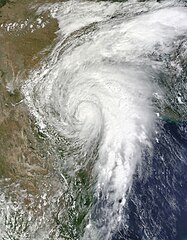Ntxw wrote:
1903-1906 also had some very cold winters. 1904-1905 Nino may have been a super El Nino according to SOI records. It had values lower than even 1982 and 1997 and Texas experienced a string of years with cold winters and top 5 coolest summers in those years surrounding this Nino. DFW average temps were very low during this Nino not unlike 76-77, 77-78. The Atlantic was completely shut down during these several years.
Portastorm wrote::uarrow:
I really would like to use 1904-05 and 1976-77 (think JB has been touting this one as a possible analog) as possible analog winters for this coming one but both had neutral to positive PDO indices and I don't think that's going to match up for this winter. Think we're going to see neutral to negative PDO values once again. Also leaning towards a west-based or Modoki Nino event. Could be wrong though as Ntxw has the goods on ENSO and it seems like recent trends suggest maybe a more basin-wide weak event?
A lot of folks are harping on 2009-10 being a solid analog and at this point I'd have to agree as it's a closer match to historical PDO values and a Modoki Nino.
There were cold winters that time. 1904 was one of the years that went La Nina to El Nino like 1911, 1976, and 2009. This past winter was a borderline La Nina. 1904-1905 had a strong El Nino in June 1905 based on Multivariate ENSO Index (MEI) and Southern Oscillation Index (SOI). Interesting to see El Nino peak in June as they tend to peak in winter, not summer. Of course that was not measured directly, so we really do not know. 1904-1905 and 1911-1912 are some of the coldest winters on record.
Top 20 Coldest Winter In America
1978-1979 26.61
1894-1895 26.65*
1935-1936 27.78
1898-1899 27.95
1909-1910 28.17
1904-1905 28.69
1928-1929 28.72
1977-1978 29.04
1916-1917 29.10
1917-1918 29.11
1911-1912 29.35
1903-1904 29.89
1976-1977 30.01
1902-1903 30.03
1948-1949 30.14
1936-1937 30.35
1914-1915 30.39
1963-1964 30.40
1983-1984 30.56
1919-1920/1984-1985 30.57
*December 1894 Data Missing
From Here
http://www7.ncdc.noaa.gov/CDO/CDODivisionalSelect.jspThe winter of 1976-1977, 1977-1978, and 1978-1979 were quite cold. 1978-1979 is the coldest winter in America going back to 1895.

America has seen more than two back to back cold winters. 1902 to 1906 and 1976 to 1979. The 1900s and 1910s were quite cool. 1895, 1899, 1904, and 1915-1917 occurred in La Nina. 2009-2010 is the 22nd coldest winter on record.
The Atlantic was in a cool phase that time in the 1900s, 1910s, and late 1970s. 1905 was a very quiet season due to that strong El Nino.
 The posts in this forum are NOT official forecast and should not be used as such. They are just the opinion of the poster and may or may not be backed by sound meteorological data. They are NOT endorsed by any professional institution or
The posts in this forum are NOT official forecast and should not be used as such. They are just the opinion of the poster and may or may not be backed by sound meteorological data. They are NOT endorsed by any professional institution or 



 America has seen more than two back to back cold winters. 1902 to 1906 and 1976 to 1979. The 1900s and 1910s were quite cool. 1895, 1899, 1904, and 1915-1917 occurred in La Nina. 2009-2010 is the 22nd coldest winter on record.
America has seen more than two back to back cold winters. 1902 to 1906 and 1976 to 1979. The 1900s and 1910s were quite cool. 1895, 1899, 1904, and 1915-1917 occurred in La Nina. 2009-2010 is the 22nd coldest winter on record.







